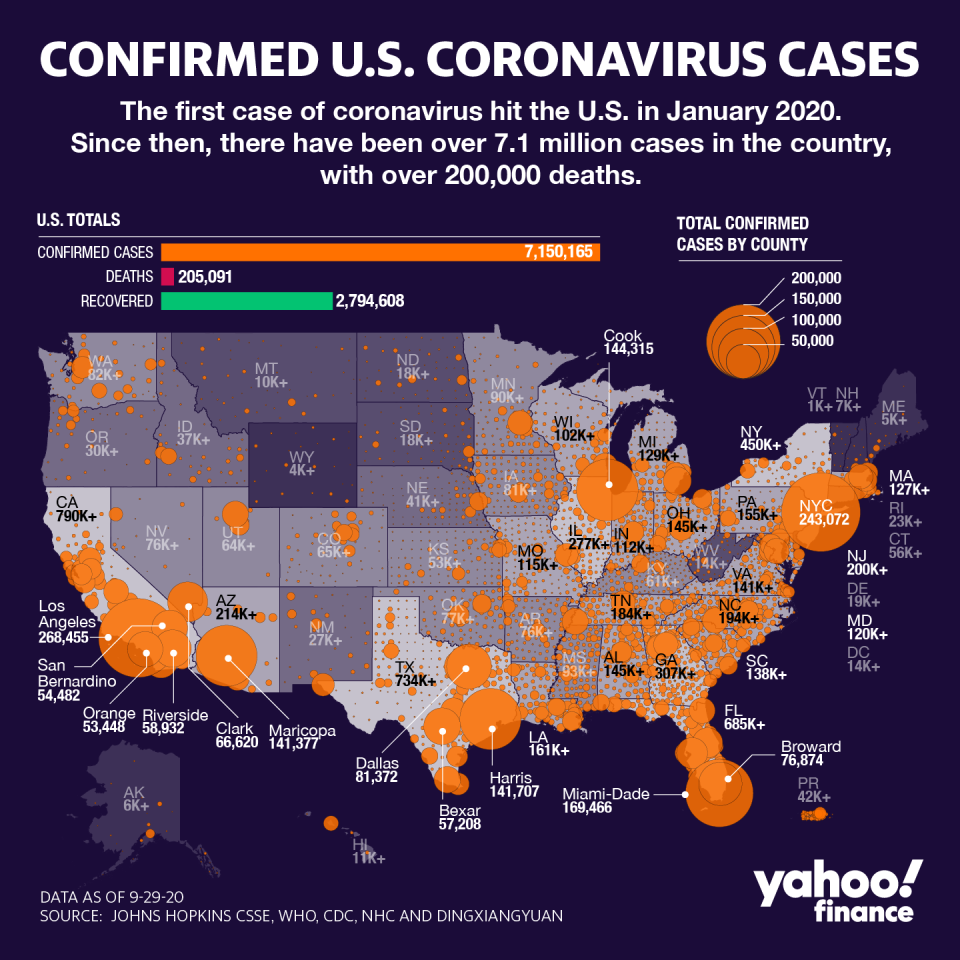Coronavirus update: Regeneron antibody therapy shows promise as feared 2nd wave swells
The search for an effective COVID-19 treatment showed signs of promise, with two major pharmaceutical companies this week announcing positive results for experimental drugs that converged with the rapid push toward a potential vaccine.
Regeneron (REGN) on Wednesday showed that its antibody cocktail therapy reduced the viral load in patients. The company reiterated the treatment has additional potential as a pseudo-vaccine that can be taken as protective treatment rather than just after an infection, and expects to publish the complete data in a medical journal in the near-term.
Regeneron’s data follows positive news from Eli Lilly (LLY) on an antibody treatment that reduced recovery time in hospitalized covid patients, and builds on existing efforts to try and mitigate the coronavirus’ spread. This week, global deaths surged over 1 million, with Europe and the U.S. battling against a dreaded second wave of infections.
In a research note, SVB Leerink said there is still more information needed, but it appeared likely both Regeneron and Eli Lilly would receive approval this year, as hopes build that governments can stem the tide of new diagnoses by year’s end via a vaccine.
Both Regeneron and Lilly’s treatments “increased the rate of clearance of the virus, and shortened the duration of disease, although given the study sizes they did not show an absolute mortality benefit,” the firm wrote. “Both studies suggest that these antibodies will confer significant treatment benefit for symptomatic, and possible moderate COVID patients,” the note said.

The countdown to a vaccine approval is nearing its end with October just a day away. New information about leading candidates, as well as promising treatment options, continue to pour in.
In the latest publication in a medical journal, Moderna (MRNA), one of two leading mRNA U.S.-based vaccine candidates, revealed results of an extended Phase 1 study in older Americans.
As previously noted by the company, the results showed the two-shot vaccine, in a higher dose, was equally effective on older adults as it was on younger groups. While there were two severe adverse events reported, which included high fever and fatigue, experts note those side effects are about the same as seen in older adults who receive high-dose flu shots annually.
Moderna expects to have results of its late-stage vaccine trial by November.
Pfizer (PFE) and BioNTech (BNTX) anticipate the first read-outs of their vaccine by the end of October— even as health experts have called for a month delay for greater observation time of trial participants. If Pfizer agrees, it would mean any news of a vaccine by Election Day would be erased.
Minorities bear brunt of virus
Amid a widespread debate about how to manage the mounting economic fallout of the COVID-19 crisis, researchers are just beginning to comprehend the depths of the outbreak’s disproportionate impact on minorities.
A new poll from NPR, the Robert Wood Johnson Foundation and the Harvard T.H. Chan School of Public Health shows that among the more than 3,400 Americans surveyed in July, more than 60% of those living with children are reporting serious financial problems.
Of those, 86% of Latino households and 66% of Black households reported hardships, compared to about 50% of white household reported negative impacts. The new study highlighted a trend that began in March when the virus began swamping the world’s largest economy, triggering widespread lockdowns on public life.
The findings complemented an earlier study from the Urban Institute showing that Latinos and African-Americans were largely reliant on jobs outside the home. Only 35% of Black adults and 25% of Latinos reporting they could work, at least partly, from home.
Moreover, the Urban Institute data found that after a month of the pandemic, more than 45% of Black and Latino adults had experienced hardships stemming from financial setbacks — including food insecurity and inability to pay mortgage, rent or utilities. At the time, that was double the response from white families.
More from Anjalee:
Redfield: CDC 'preparing earnestly' for vaccine in November, December
India's tech giants navigate 'literally spiking' WFH demand, H1-B fears in coronavirus era
How protests spurred Corporate America into action on race, inequality
Read the latest financial and business news from Yahoo Finance
Follow Yahoo Finance on Twitter, Facebook, Instagram, Flipboard, SmartNews, LinkedIn, YouTube.
